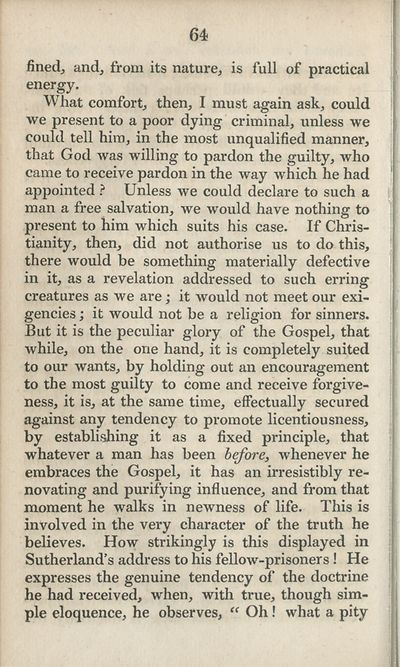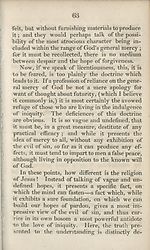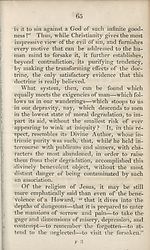Crime & punishment > Notes of conversations with H. M'Donald, N. Sutherland, and H. M'Intosh, (who were executed at Edinburgh, April 22, 1812,) during the time they were under sentence of death
(72)
Download files
Complete book:
Individual page:
Thumbnail gallery: Grid view | List view

64
fined, and, from its nature, is full of practical
energy.
What comfort, then, I must again ask, could
we present to a poor dying criminal, unless we
could tell him, in the most unqualified manner,
that God was willing to pardon the guilty, who
came to receive pardon in the way which he had
appointed ? Unless we could declare to such a
man a free salvation, we would have nothing to
present to him which suits his case. If Chris¬
tianity, then, did not authorise us to do this,
there would be something materially defective
in it, as a revelation addressed to such erring
creatures as we are; it would not meet our exi¬
gencies ; it would not be a religion for sinners.
But it is the peculiar glory of the Gospel, that
while, on the one hand, it is completely suited
to our wants, by holding out an encouragement
to the most guilty to come and receive forgive¬
ness, it is, at the same time, effectually secured
against any tendency to promote licentiousness,
by establishing it as a fixed principle, that
whatever a man has been before, whenever he
embraces the Gospel, it has an irresistibly re¬
novating and purifying influence, and from that
moment he walks in newness of life. This is
involved in the very character of the truth he
believes. How strikingly is this displayed in
Sutherland’s address to his fellow-prisoners! He
expresses the genuine tendency of the doctrine
he had received, when, with true, though sim¬
ple eloquence, he observes, “ Oh! what a pity
fined, and, from its nature, is full of practical
energy.
What comfort, then, I must again ask, could
we present to a poor dying criminal, unless we
could tell him, in the most unqualified manner,
that God was willing to pardon the guilty, who
came to receive pardon in the way which he had
appointed ? Unless we could declare to such a
man a free salvation, we would have nothing to
present to him which suits his case. If Chris¬
tianity, then, did not authorise us to do this,
there would be something materially defective
in it, as a revelation addressed to such erring
creatures as we are; it would not meet our exi¬
gencies ; it would not be a religion for sinners.
But it is the peculiar glory of the Gospel, that
while, on the one hand, it is completely suited
to our wants, by holding out an encouragement
to the most guilty to come and receive forgive¬
ness, it is, at the same time, effectually secured
against any tendency to promote licentiousness,
by establishing it as a fixed principle, that
whatever a man has been before, whenever he
embraces the Gospel, it has an irresistibly re¬
novating and purifying influence, and from that
moment he walks in newness of life. This is
involved in the very character of the truth he
believes. How strikingly is this displayed in
Sutherland’s address to his fellow-prisoners! He
expresses the genuine tendency of the doctrine
he had received, when, with true, though sim¬
ple eloquence, he observes, “ Oh! what a pity
Set display mode to:
![]() Universal Viewer |
Universal Viewer | ![]() Mirador |
Large image | Transcription
Mirador |
Large image | Transcription
| Permanent URL | https://digital.nls.uk/125759719 |
|---|
| Description | Thousands of printed books from the Antiquarian Books of Scotland collection which dates from 1641 to the 1980s. The collection consists of 14,800 books which were published in Scotland or have a Scottish connection, e.g. through the author, printer or owner. Subjects covered include sport, education, diseases, adventure, occupations, Jacobites, politics and religion. Among the 29 languages represented are English, Gaelic, Italian, French, Russian and Swedish. |
|---|

